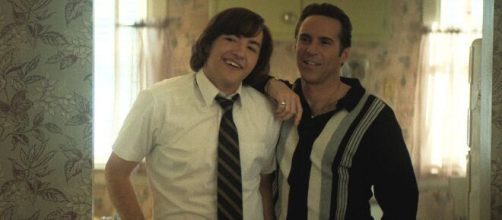Like "Twin Peaks Fire Walk With Me," another prequel film to a television phenomenon, "The Many Saints of Newark," is unashamedly for the fans of the series that spawned it: "The Sopranos." As someone who's watched the show knows the show and regards it as the harbinger of what we call "the Golden Age of Television," it's impossible for me to know what a newcomer will make of it. That being said, it falls short of working as a standalone film divorced from the original series. Case in point, the very first shot of the film is a spoiler for one of the final episodes.
Spoilers for "The Sopranos" ahead, so read at your own risk.
The story of Dickie Moltisanti
Narrated by the ghost of Christopher Moltisanti, "The Many Saints of Newark" tells the tale of a young Tony Soprano and his relationship with Dickie Moltisanti -- a character shrouded in mystery in the series. Set in the 1960s and 1970s in Newark, Jersey, the story touches on the race riots, Dickie's struggle for power with one of his former associates, and the tragic upbringing of Tony.
I'll admit, the idea of a prequel "Sopranos" story didn't exactly sit right with me. Part of the strength of the original series was its ambiguity and adamant refusal to give the audience easy answers. I was concerned that it would make the same mistake of other prequels to franchises such as "Star Wars" and "Lord of the Rings" and show us famous events that worked better as stories spun to us by characters we knew be compulsive liars.
Would we be subjected to a needless reenactment of events such as Tony's first hit or the famous card game robbery that made him rise in the ranks? Fortunately, David Chase is much too smart to go for the easy route and instead dives deep into the relationship between Tony and the only moral compass he had in his life before Dr. Melfi.
Who made Tony Soprano?
Tony Soprano was a character who we knew was capable of vile and horrible acts but tried in vain to retain what little humanity he knew he had. Here, there's a scene where Dickie tries to set young Tony straight after he gets caught running a gambling operation at his school. Tony insists that he tries to be good, to which Dickie retorts, "I don't think so.
Try harder." Tony isn't lying. We see clearly that he's troubled by the lifestyle that is constantly thrust upon him, but it's also the only life he knows.
The tagline of the film is "who made Tony Soprano?" We're led to believe that Dickie, this violent underhanded criminal, corrupted Tony and started him on his path of darkness. However, David Chase once again eschews easy answers for complex problems. We learn that not only was Dickie the only real parental figure in Tony's life but that his death ruined any hope that Tony had at avoiding the lifestyle that would doom him and everyone he loved.
The most heart-wrenching shot of the film is a pinkie swear that young Tony makes with Dickie. We're instantly reminded that the same hands we see locked with Dickie's will eventually be used to suffocate the latter's son to death.
Unfortunately, these are themes and questions that were better explored in "The Sopranos." It hurts to say, but the tale of Tony Soprano and the complex world of his lifestyle were better served by the medium of television rather than film. A story has more time to breathe in a show, and characters have more freedom to be developed and fleshed out. David Chase has been outspoken in his belief that this story was meant to be viewed on the big screen, but the choice to tell it through a film rather than a mini-series hurts more than it helps. Subplots such as the race riots and the struggle between Dickie and his former associate are exciting but lack the possible payoff in a series. Even Tony's plot, for all its strengths, gets shortchanged by the more restricted runtime and uneven pacing.
Fans might also get a chuckle at the many in-jokes told in the film, such as Junior's opinion on Tony's varsity ambitions, but newcomers might find themselves scratching their heads. Fortunately, these nostalgia pandering moments are few and far between. To paraphrase Tony, 'Remember when' is the lowest form of filmmaking.
Michael Gandolfini masterfully channels the character that his late father brought to life, and Alessandro Nivola is equally compelling as Dickie Moltisanti. The supporting cast shines as well, with Vera Farmiga doing justice to the late Nancy Marchand as a younger Livia and Billy Magnussen's perfect impression of Paulie. The only real blemish is John Magaro, whose Silvio feels more at home on a comedy sketch than a proper "Sopranos" film.
Offer fans can't refuse
While the story of Dickie Moltisanti and his relationship with a young Tony Soprano has its moments, its meandering episodic nature mixed with a bunch of side stories that don't really go anywhere make it hard to recommend to non-fans wholeheartedly. Fortunately, David Chase has not lost his touch at crafting engaging characters and dialogue. Simply put, it's great to be in this world and see these characters once again, even if the storytelling is a little weaker this time. If you haven't seen the series, you're better off refraining from this film until you do, as it spoils major events are executed better in the show. Essential viewing for fans, but only a marginal recommendation for newcomers. In the words of Christopher, "Sorry, T."


